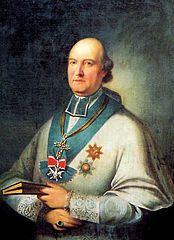He was born on 23 April 1742, educated by the Jesuits in Kamianets and Lviv and probably studied in Rome. He obtained a doctoral degree in law at the University of Kraków. In 1776, he was ordained. In the same year, he published a treatise entitled Prawdziwy stan duchowieństwa w Polsce [“True condition of clergy in Poland”], in which he stressed the importance of religion and the clergy for the state, citing, inter alia, Locke, Montesquieu and Rousseau. In 1778, he published a memorandum entitled Uwagi polityczne imieniem stanu duchownego do zbioru praw polskich podane [“Political observations on Polish laws offered in the name of clergy”], which contained his commentary on the code of laws developed under the direction of Andrzej Zamoyski. The respect that the author of the “Observations” enjoyed among the ecclesiastical hierarchy was reflected by the fact that his speech was supposed to express not just his own position but that of the entire clergy, and it is believed that it was commissioned by the papal nuncio G.A. Archetti. The following years brought yet more successes to Skarszewski, involving winning both Church (in 1790, he was appointed bishop of the Chełmsko-Lublin diocese) and state (by the decision of King Stanisław August, he became secretary of the Perpetual Council) offices. During the work of the Great Sejm, Skarszewski advocated preserving the privileges of the Catholic Church, including its position in relation to other Christian denominations, and especially the Orthodox Church. He expressed his opinions in e.g. his List plebana do korrespondenta warszawskiego [“Parish priest’s letter to the Warsaw correspondent”] of 1788, which caused considerable debates. Skarszewski also wrote Odpowiedź plebana na nowe zarzuty przeciwko duchowieństwu polskiemu [“Parish priest’s answer to new charges against the Polish clergy”]. Uninitiated into the plan to quickly adopt the Constitution of May 3, he expressed scepticism about some of its provisions, and also criticised the manner in which it was pushed through the Sejm, but nevertheless he made an oath to respect it. This did not prevent him from joining the Targowica Confederation in 1792. The confederates, obeying the Russian dictate, opposed the reformers of the political system of the collapsing Polish state. He participated in negotiations with Russia to agree the relationship between the Russian Empire and the Polish-Lithuanian Commonwealth in view of the work of the Great Sejm having been negated. He criticised the ideas of the French Revolution in his Skutki nowej filozofii spokojności krajowej grożące [“Effects of the new philosophy which threaten national peace”] (1793), warning against importing such ideas to Poland. When the Kościuszko Uprising broke out, following instructions from Primate Michał Jerzy Poniatowski he issued a pastoral letter in which he ordered the clergy and the faithful to show obedience to authorities of the insurgency. However, this failed to protect him from arrest when those authorities, also under pressure from the public, decided to properly deal with those who took part in the Targowica Confederation. He was not executed as e.g. Bishop Massalski and other traitors hanged during the riots of 28 June 1794, but the Military Criminal Court (despite interventions, among others, by Stanisław August Poniatowski) sentenced him to death. About to be executed, he was saved almost at the last moment – by Tadeusz Kościuszko’s decision, the death penalty was commuted to life imprisonment. He regained his freedom a few weeks later, escaping among the chaos engendered by the defeat of the uprising. Both in the Duchy of Warsaw and in the Kingdom of Poland (after the Congress of Vienna), he stayed loyal to the authorities provided that they did not take any actions contrary to the position or teaching of the Church (as in the case of divorce – he was opposed to any attempts to make it admissible and in particular to remove it from the jurisdiction of ecclesiastical courts); he also continued to proclaim his views on the leading role of religion and clergy (e.g. his dissertation O władzy duchowej [“On spiritual authority”], 1820). In 1824, he became the Archbishop of Warsaw and the Primate of the Kingdom of Poland. He died on 12 June 1827 in Warsaw.

